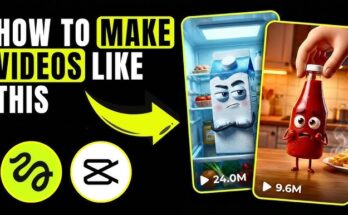In the fast-paced world of content creation, one of the most trending and captivating video formats emerging on social media is the Mini Workers Video. These videos feature tiny, animated or semi-realistic characters that look like miniature humans doing real-life tasks—like fixing electronics, cleaning floors, working in factories, or even managing a construction site—inside real-world environments. The result? A whimsical, mind-bending fusion of fantasy and realism that leaves viewers fascinated.
Thanks to the rapid evolution of AI video generation tools, what used to be an expensive, time-consuming animation process can now be achieved with surprising ease—even by beginners.
In this comprehensive guide, we’ll break down exactly how to create a Mini Workers video using AI, which tools you need, how to blend real and synthetic content, and how to publish your creations for maximum viral impact.
🔍 What is a Mini Workers Video?
A Mini Workers video is a type of short-form visual content where tiny, human-like workers are seen interacting with everyday objects or environments. Think of scenes like:
- Miniature robots repairing a smartphone.
- Tiny workers cleaning inside a coffee mug.
- Pocket-sized builders constructing a tower from books.
These videos often blend real footage with AI-generated animations or models, creating the illusion that miniature people or robots are physically present and working in the real world.
🧠 Why Use AI for Mini Workers Videos?
Creating such visual illusions manually used to require expertise in:
- 3D modeling
- Compositing
- VFX (Visual Effects)
- Animation software like Blender, After Effects, or Maya
But with AI-powered tools, creators can now generate, animate, and composite mini characters into real-world footage with minimal technical skills. Benefits include:
✅ No 3D design background required
✅ Automated character generation
✅ Easy scene integration
✅ Low cost and faster turnaround
✅ Highly shareable and viral-worthy content
🛠️ Tools You’ll Need to Create a Mini Workers Video
Let’s start with the toolkit. You’ll need the following software or platforms (most are free or freemium):
1. AI Character Generator
- Didimo, Ready Player Me, or Artbreeder
- These platforms help you create stylized or realistic characters.
2. AI Animation Tools
- Krikey AI, Move.ai, or Plask
- Upload body motions or input text-to-animation instructions to animate your mini workers.
3. Video Editing & Compositing
- Runway ML, Pika Labs, or CapCut (Pro version)
- Use these tools to blend the generated characters with real-world videos.
4. Background Footage (Real Environment)
- Shoot your own clip or download royalty-free videos from sites like Pexels, Pixabay, or Videvo.
5. Voice AI (Optional)
- ElevenLabs, Voicemod, or Lovo.ai
- Add voiceovers or character dialogue using AI-generated speech.
🎬 Step-by-Step Guide to Making a Mini Workers Video with AI
✅ Step 1: Plan Your Scene
Start with a simple idea. Think about a small task that mini workers could be doing. Here are a few creative examples:
- Mini workers cleaning the inside of a computer keyboard
- Tiny construction team building a bridge across books
- Pocket-sized repair crew fixing a cracked phone screen
Sketch out a storyboard or write down a sequence to organize your thoughts.
✅ Step 2: Capture or Find Real Background Footage
Your real-world footage is the stage for your tiny actors.
- Use a smartphone or camera to film a short 5–10 second clip of a static or semi-static scene.
- Make sure the lighting is good and the camera is stable (use a tripod if possible).
- Alternatively, search free stock footage platforms for a suitable video clip.
📌 Pro Tip: Filming slightly from above creates more depth and realism for tiny character illusions.
✅ Step 3: Generate Mini Characters with AI
Choose your character type:
- Human workers in uniforms
- Robot assistants
- Cartoon-like animated laborers
Use Ready Player Me or Didimo to generate a character model. Upload a selfie or design from scratch.
Once your character is ready, download it in a compatible format like .glb, .fbx, or .obj.
📌 Tip: For stylized animations, cartoon characters work better. For realism, stick to human-like proportions.
✅ Step 4: Animate the Characters
Now it’s time to bring your mini workers to life.
Option A: Use Motion Capture (Easy)
- Platforms like Move.ai or Plask allow you to upload a video of yourself acting out motions (e.g., hammering, sweeping, walking).
- The platform will extract the motion and apply it to your 3D character.
Option B: Use Prebuilt Animations
- Some platforms offer pre-animated actions like “sweeping floor”, “hammering”, or “dragging an object”.
- Apply these animations directly to your character without doing any motion capture.
Once animated, export the character in a transparent or green-screen background video file format.
✅ Step 5: Scale and Composite with Real Footage
Now merge your AI-generated character video with your real-world footage using Runway ML, CapCut Pro, or Pika Labs.
Here’s what to do:
- Import both videos into your editing tool.
- Resize the character so they look tiny compared to the real objects.
- Position them realistically—e.g., on a desk, floor, or book stack.
- Add shadows to blend them into the environment.
- Match lighting and color tones for a seamless look.
📌 Pro Tip: If your background moves (e.g., a camera pan), use motion tracking to keep the mini worker anchored.
✅ Step 6: Add Sound Effects & Voice (Optional)
Sound design adds realism. Try these:
- Add tiny hammering sounds
- Background factory noise
- Miniature footsteps
- High-pitched voiceover dialogue
Use AI tools like ElevenLabs to generate squeaky, humorous voiceovers that match the tiny scale of your characters.
✅ Step 7: Export and Publish
Once your video is polished:
- Export it in 1080p or 4K resolution.
- Choose a high frame rate (30 or 60 fps) for smooth movement.
- Keep video duration under 1 minute for platforms like TikTok, YouTube Shorts, and Instagram Reels.
📢 Where to Share Your Mini Workers Videos
To go viral, choose the right platform and format:
| Platform | Best Format | Caption Tip |
|---|---|---|
| TikTok | Vertical (9:16) | Use trending sounds |
| YouTube Shorts | Vertical (9:16) | Add hashtags like #MiniWorkers |
| Instagram Reels | Vertical | Use playful emojis & challenges |
| Facebook Reels | Vertical | Add a short story or description |
| Reddit (e.g., r/interestingasfuck) | Horizontal (16:9) | Post with a catchy title |
🧪 Creative Ideas & Variations
Need inspiration? Try these unique twists:
🔧 Mini Repair Crew
- Mini engineers repairing a broken laptop screen.
🧽 Tiny Cleaning Team
- Tiny robots mopping up spilled coffee inside a mug.
🏗️ Desk Construction
- Mini builders assembling a bridge across stationery items.
🎮 Game World Workers
- Create a Mario-style platform where mini workers “live” in a game level.
⚡ Advanced Techniques (Optional)
Want to level up?
1. Use Blender + AI
- Import your AI characters into Blender for high-end rendering and lighting.
- Use AI scripts (like ChatGPT-generated Blender Python code) to automate animations.
2. Green Screen Editing
- Use a physical green screen when filming live footage to better integrate characters.
3. Camera Tracking
- Use tools like After Effects or Runway’s Motion Tracking to keep your character synced with camera movement.
📈 How to Make Your Mini Workers Videos Go Viral
Here’s how to improve your chances of virality:
- Hook viewers in the first 2 seconds.
- Add surprise elements (e.g., mini workers reacting to a cat).
- Use relatable themes (e.g., cleaning, organizing, fixing tech).
- Add funny or emotional narration.
- Include hashtags:
Prompt:
“A creative miniature scene featuring tiny construction workers in safety vests and helmets working on a giant 3D YouTube play button logo. The workers are climbing ladders, painting, chiseling, hammering, and repairing the oversized red play button, with red paint splattered on the ground and scattered tools around them. The scene looks playful, cinematic, and highly detailed with realistic lighting, shadows, and a soft background with plants, giving a sense of a surreal miniature world.”
🧭 Final Thoughts: The Future of Mini Workers Videos
As AI-generated content becomes more accessible, Mini Workers videos are just the beginning of an entire era of surreal, fun, and engaging storytelling. Whether you’re a casual creator, a brand, or a content strategist, this format offers a unique way to spark curiosity and delight audiences.
For more Information Visit Puletech


